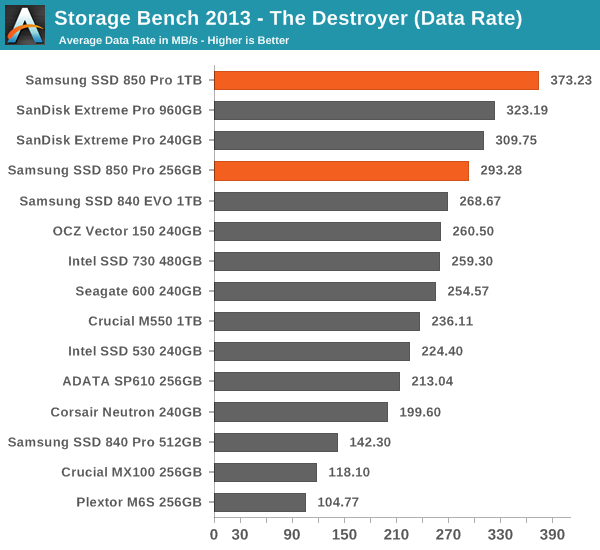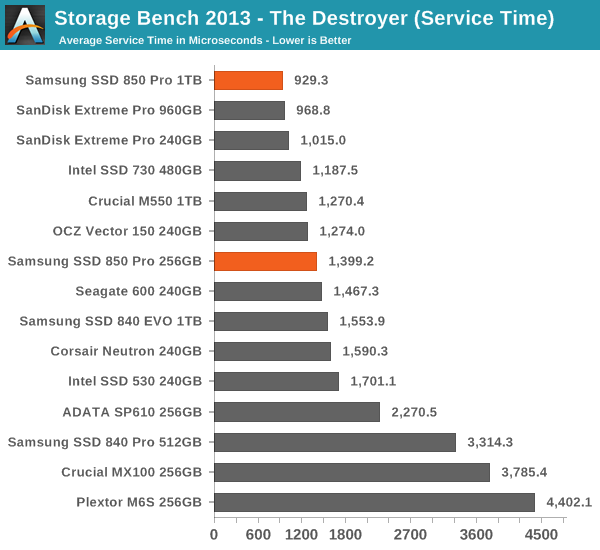Samsung SSD 850 Pro (128GB, 256GB & 1TB) Review: Enter the 3D Era
by Kristian Vättö on July 1, 2014 10:00 AM ESTAnandTech Storage Bench 2013
Our Storage Bench 2013 focuses on worst-case multitasking and IO consistency. Similar to our earlier Storage Benches, the test is still application trace based - we record all IO requests made to a test system and play them back on the drive we are testing and run statistical analysis on the drive's responses. There are 49.8 million IO operations in total with 1583.0GB of reads and 875.6GB of writes. I'm not including the full description of the test for better readability, so make sure to read our Storage Bench 2013 introduction for the full details.
| AnandTech Storage Bench 2013 - The Destroyer | ||
| Workload | Description | Applications Used |
| Photo Sync/Editing | Import images, edit, export | Adobe Photoshop CS6, Adobe Lightroom 4, Dropbox |
| Gaming | Download/install games, play games | Steam, Deus Ex, Skyrim, Starcraft 2, BioShock Infinite |
| Virtualization | Run/manage VM, use general apps inside VM | VirtualBox |
| General Productivity | Browse the web, manage local email, copy files, encrypt/decrypt files, backup system, download content, virus/malware scan | Chrome, IE10, Outlook, Windows 8, AxCrypt, uTorrent, AdAware |
| Video Playback | Copy and watch movies | Windows 8 |
| Application Development | Compile projects, check out code, download code samples | Visual Studio 2012 |
We are reporting two primary metrics with the Destroyer: average data rate in MB/s and average service time in microseconds. The former gives you an idea of the throughput of the drive during the time that it was running the test workload. This can be a very good indication of overall performance. What average data rate doesn't do a good job of is taking into account response time of very bursty (read: high queue depth) IO. By reporting average service time we heavily weigh latency for queued IOs. You'll note that this is a metric we have been reporting in our enterprise benchmarks for a while now. With the client tests maturing, the time was right for a little convergence.

Thanks to the excellent IO consistency, the 850 Pro dominates our 2013 Storage Bench. At the 1TB capacity point, the 850 Pro is over 15% faster than any drive when looking at the average data rate. That is huge because the 850 Pro has less over-provisioning than most of today's high-end drives and the 2013 Storage Bench tends to reward drives that have more over-provisioning because it essentially pushes drives to steady-state. The 256GB model does not do as well as the 1TB one but it is still one of the fastest drives in its class. I wonder if the lesser amount of over-provisioning is the reason or perhaps the Extreme Pro is just so well optimized for mixed workloads.











160 Comments
View All Comments
alacard - Monday, June 30, 2014 - link
Fascinating stuff, thanks for the in depth analysis.Iketh - Tuesday, July 1, 2014 - link
Good read on the software not taking advantage of SSDs yet. Windows is the biggest offender. I have 8 threads and an SSD and I still have to wait for each of my startup programs to load like a snail 1 at a time after bootup...tetsuo77 - Monday, June 30, 2014 - link
"There are some drops, although I am not sure what is causing them"It looks suspiciously like your values overflowed an unsigned int (prior to being converted from B to KB). Just add ~4.3 million to the 4 mysteriously low values and you have a nicely shaped curve.
tetsuo77 - Monday, June 30, 2014 - link
Oops.. I pasted the wrong quote. Meant to quote this: "It looks like read performance scales quite linearly until hitting the IO size of 256KB where RAPID stops caching"I maintain that there is an error in the numbers on the graph :)
Gigaplex - Tuesday, July 1, 2014 - link
32 bit unsigned integers support around 4.3 billion, not million.lyeoh - Friday, July 4, 2014 - link
if the values were being stored internally as bytes and not kilobytes it might overflow as tetsuo77 mentioned. 4.3 million * kilobytes per sec = billions of bytes/sec which could overflow.nirwander - Monday, June 30, 2014 - link
I cant see how they aim at mainstream with these prices.Crucial MX100 512 is already fast enough for SATA 6 Gbps and.. twice as cheap!
Technology geeks will probaly go for Intel PCIe NVMe drives.
Gigaplex - Monday, June 30, 2014 - link
And if you really need the performance, just get two of the MX100s and RAID 0 them.willis936 - Tuesday, July 1, 2014 - link
Unless you care about storage latency at all.Gigaplex - Tuesday, July 1, 2014 - link
Fair point, but SSDs are so far ahead of hard drives in terms of latency that it hardly matters.